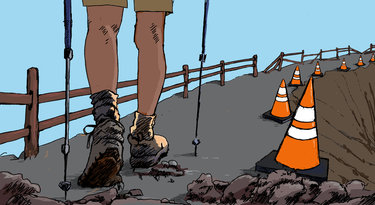‘Our march to freedom is not complete unless want is annihilated’
Thanksgiving is upon us — a uniquely American holiday when families gather around tables laden with plenty.
Many of us were shaken in recent weeks as federal funds for the poor hung in jeopardy to reconcile the fact that, in this land of plenty, one in eight Americans doesn’t have enough to eat.
The quintessential vision of an American Thanksgiving was captured by Norman Rockwell in the midst of World War II, showing a smiling family gathered around a carefully set table as an elderly woman, wearing an apron over her dress, prepares to place a large cooked turkey on the table.
The Saturday Evening Post had commissioned Rockwell to depict the Four Freedoms that Franklin Delano Roosevelt had outlined in his 1941 State of the Union address.
Roosevelt gave the speech to Congress two years after Europe was embroiled in the war but nearly a year before the Japanese bombed Pearl Harbor, causing the United States to enter the fray.
His Four Freedoms speech helped move the nation away from isolationism and towards a commitment to universal human rights. Roosevelt called the moment “unprecedented in the history of the Union.”
As we now find ourselves again in unprecedented times, it is instructive to reflect on the words our president spoke in 1941. “The American people have unalterably set their faces against that tyranny,” he said of the tyranny then spreading over every continent.
“The future and the safety of our country and of our democracy are overwhelmingly involved in events far beyond our borders.” Roosevelt also warned, “We must especially beware of that small group of selfish men who would clip the wings of the American eagle in order to feather their own nests.”
The United States today has a small but powerful billionaire class that has managed an outsized role in running our government. As Roosevelt asked Congress for funds for armaments to send overseas, he spoke of the need to sacrifice for the greater good.
“A free nation has the right to expect full cooperation from all groups,” he said, naming leaders of business, of labor, and of agriculture.
“As men do not live by bread alone, they do not fight by armaments alone ….,” he said. “The mighty nation that we are calling for cannot be based on a disregard of all things worth fighting for.”
Among the things he named were equality of opportunity, jobs for those who can work, security for those who need it, the ending of special privilege for the few, and the preservation of liberties for all.
“I have called for personal sacrifice,” Roosevelt said. “And I am assured of the willingness of almost all Americans to respond to that call.”
He concluded his speech, “In the future days, which we seek to make secure, we look forward to a world founded upon four essential human freedoms.”
That is when he outlined the Four Freedoms, each one to apply “everywhere in the world”: the freedom of speech and expression, the freedom of every person to worship God in his own way, the freedom from want, and the freedom from fear.
“That is no vision of a distant millennium,” Roosevelt said. “It is a definite basis for a kind of world attainable in our own time and generation. That kind of world is the very antithesis of the so-called new order of tyranny which the dictators seek to create with the crash of a bomb ….
“Freedom means the supremacy of human rights everywhere. Our support goes to those who struggle to gain those rights and keep them. Our strength is our unity of purpose.”
These principles helped shape the Universal Declaration of Human Rights, drafted by a committee chaired by Eleanor Roosevelt, and adopted by the United Nations General Assembly in 1948.
Eighty-four years after FDR’s Four Freedoms speech, we are in a time of increasingly discordant public dialogue in which the foundational idea of sacrificing for the common good, and of civic engagement and civil discourse is called into question.
Certainly we see places locally where concern for the common good is still central. We saw it over the last month with the contributions we covered to our local food pantries.
We saw it on Saturday when the founders of Gathering Hope cut a ribbon to celebrate their first four weeks of curbing hunger in the Hilltowns. Gathering Hope, which serves people in Berne, Knox, Westerlo, and Rensselaerville, is a collaborative effort of the Helderberg Family and Community Organization and the Knox Thompson’s Lake Reformed Church.
In September, as Gathering Hope planned to shift from being a pending to being an active member of the Regional Food Bank, the cuts in federal funding froze all new and pending applications indefinitely. A grant from 100 Women Who Care and local fundraisers and donations filled the gap.
Since opening on Oct. 21, Gathering Hope already has 107 clients and has accepted over 4,000 pounds of food. Maryellen Gillis, who heads HFCO, spoke of “the love we have felt for the last 13 months” as volunteers set up the food pantry. “Every time we put out a call,” she said, it was answered. “We said, ‘we need’ … and some community members came.”
We saw it this week, too, at a ceremony celebrating the construction of a new McKownville firehouse. “Duty to community” is how Jim White described the work of McKownville’s volunteer firefighters.
The state senator speaking at that event noted the sacrifices that had been made. We’ve written on this page not just about the obvious risks these volunteer firefighters face but of the pernicious and more hidden risk of cancer caused by the carcinogens they encounter in fighting fires.
These men and women embody the ideal of sacrifice for the common good.
On the national level, though, our government is no longer working for a shared common good. The recent disregard for the many citizens reliant on food stamps is emblematic of that.
The stunning essay that the Post published in 1943 to run with Rockwell’s painting of a Thanksgiving table is also instructive in our current times.
It was written by Filipino novelist and poet Carlos Bulosan. Growing up poor in a farming village in the Philippines, Bulosan immigrated to the United States in the 1930s to find work as a migrant laborer.
Bulson began “Freedom from Want” by describing people like himself, people struggling to make their way in America: “If you want to know what we are, look upon the farms or upon the hard pavements of the city. You usually see us working or waiting for work, and you think you know us, but our outward guise is more deceptive than our history.”
He goes on, “Our march toward security and peace is the march of freedom — the freedom that we should like to become a living part of.”
Bulosan understood the need for people to be well fed — literally and figuratively — to make a democracy work.
“It is only when we have plenty to eat — plenty of everything — that we begin to understand what freedom means,” he wrote. “To us, freedom is not an intangible thing. When we have enough to eat, then we are healthy enough to enjoy what we eat. Then we have the time and the ability to read and think and discuss things. Then we are not merely living but also becoming a creative part of life. It is only then that we became a growing part of democracy.”
He wrote of faith as a living thing that can be crippled or chained, that “can be killed by denying us enough food or clothing, by blasting away our personalities and keeping us in constant fear.”
Bulosan also wrote, “Our challenge to tyranny is the depth of our faith in a democracy worth defending.”
We, as a people, must not lose that faith after so many fought, and so many died, to preserve it.
“We are fighting where the bullet is crashing upon armorless citizens,” he wrote, “where the tear gas is choking unprotected children. Under the lynch trees, amidst hysterical mobs. Where the prisoner is beaten to confess a crime he did not commit. Where the honest man is hanged because he told the truth.”
He goes on, “But our march to freedom is not complete unless want is annihilated …. What do we want? We want complete security and peace. We want to share the promises and fruits of American life. We want to be free from fear and hunger.”
Bulosan returns at the end to the phrase with which he opened his essay:
“If you want to know what we are — we are marching!”
As this day of Thanksgiving is upon us, let us continue the march.



